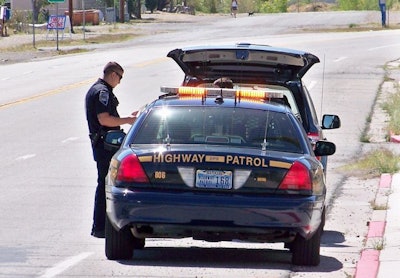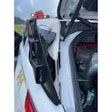 Photo courtesy of Mark Holloway/Flickr.
Photo courtesy of Mark Holloway/Flickr.
The Nevada Highway Patrol has agreed to reduce its fleet of vehicles and allow greater monitoring of fleet operations following a state audit.
In an audit released earlier this month, the Nevada Department of Administration's Division of Internal Affairs said reducing the fleet size could save up to $7.2 million in one-time purchase costs and up to $1.8 million annually.
The Highway Patrol had a total of 593 patrol vehicles as of August 2012. There are currently 485 authorized sworn office positions open, of which 430 are filled. The report recommends a fleet size of between 416 and 474 vehicles, which would be a 20%–30% reduction.
The report covers how many vehicles the fleet should have in different phases of the vehicles' lifecycle schedules. The phases include pre-deployment, deployment (operational use), and post-deployment (before the Highway Patrol turns the vehicles over to the state purchasing department). The report recommends the agency have 396 to 451 vehicles deployed and 20 to 23 vehicles split between the pre- and post-deployment phases.
Total savings from the reduced fleet size start at a one-time amount of $4.82 million if the fleet size matches the number of sworn officer positions open. Savings increase to $7.2 million if the agency reduces the fleet size to the number of actual filled sworn officer positions. Internal Affairs used the same two scenarios to calculate annual savings, which start at $1.2 million and go as high as $1.8 million.
The Internal Affairs division also estimates that increasing oversight of fleet operations could save up to $426,000 annually. The report says regional commands manage repair and radio shops that provide both vehicle- and radio-related services. At the regional commands, sworn officers who have other duties are managing shop operations. The report says officers may not be managing shop operations effectively due to the need to split their workload among different duties. The Internal Affairs' division's report said it found that less than 50% of recorded available hours were productive for repair shop mechanics whereas the agency's goal is 80%, according to the audit.
Other oversight-related findings include incomplete or incorrect work orders, a non-functional bar code system (for tracking parts and associating them with specific work orders, for example), and a lack of documentation for physical inventories.
The agency also accepted the report's recommendations for ways to improve oversight and said it's already working to increase oversight and coordination of fleet operations. The agency said it separated work order and inventory management for radio repairs from fleet repairs. The agency also said it assigned two administration assistants to track regional command work orders, that it created a new monthly fleet management report to summarize vehicle assignments and lifecycle status (age and mileage), and that it plans to monitor work orders and labor utilization against the targets in the audit report.
By Greg Basich

















